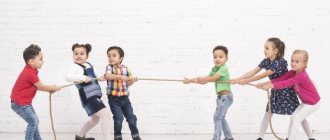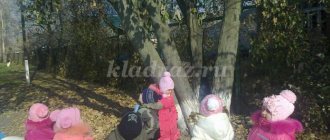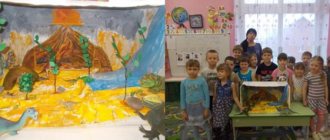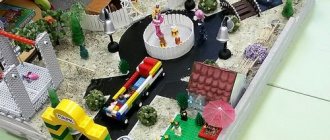Presentation “Labor education of preschoolers”
Workshop
“Labor education of preschool children” Baldin S.A. RMO for different age groups
Labor
is a powerful educator in the pedagogical system of education. A.S. Makarenko.
The relevance of the problem of labor education of preschool children
1 . Decreased interest in work.
2. Lack of desire to participate in daily work activities.
3. Poverty, narrowness and unsystematic knowledge of children about the work of adults.
4. Low level of development of labor activity by the end of preschool age.
5. Authoritarian model of labor management.
Labor education of preschool children is a joint activity of the teacher and pupils, aimed at developing general labor skills and abilities, psychological readiness for work, the formation of a responsible attitude towards work and its products, and a conscious choice of profession.
Labor education is an important means of comprehensive development of a child’s personality. Work should bring satisfaction and joy. And this is possible provided that it is feasible for the child and is understood by him as benefiting other people. Reasonably organized work strengthens the physical strength and health of the child, and also has a significant impact on the mental development of children.
Labor is the most important means of education, starting from preschool age; in the process, the child’s personality is formed and collective relationships are formed. The entire process of raising children in kindergarten can and should be organized so that they learn to understand the benefits and necessity of work for themselves and for the team.
The goal of labor education is
the formation of positive attitudes towards various types of work and creativity (Federal State Educational Standard for Education, clause 2.6)
Objectives of labor education
Familiarization with the work of adults as a standard of activity.
Formation of work activity itself
child.
Education of a child’s personality in the process of individual and collective work activity.
Objectives of labor education
1
Familiarization with adult labor as a standard of activity:
- nurturing interest in adult work,
- fostering respect for workers,
- fostering a caring attitude towards the results of work,
- fostering a desire to help adults.
Objectives of labor education
2
Formation of the child’s work activity itself:
- development of children's labor skills,
- development of the ability to plan work activities,
- formation of social motives for work.
Objectives of labor education
3
Education of a child’s personality in the process of individual and collective work:
- nurturing the right attitude towards one’s own work;
- nurturing personal qualities (hard work, independence, perseverance, responsibility);
- nurturing positive relationships between children in the process of work.
Types of labor
Self-service
– this is work aimed at serving oneself (washing, dressing, undressing, etc.)
- Social significance:
- frees others from serving themselves;
— the child masters all components of labor
activity and independence.
Types of labor
Household labor
– this is work on cleaning premises, participation in organizing household processes and social activities, etc.
- The peculiarity of household labor is its social orientation,
those. meeting the needs of other children and adults.
Types of labor
Labor in nature
- Caring for plants and animals, growing vegetables, landscaping, etc.
- Significance: has a beneficial effect not only on the development of labor skills, but also on the education of moral feelings, laying the foundations of environmental education.
- Features: - the result of this type of labor can be a material product (harvest). This brings child labor closer to adult labor; - most often this type of work has a delayed result; — labor in nature is always associated with living objects, therefore it forms a careful, responsible, careful attitude towards the environment; - provides an opportunity to simultaneously develop cognitive interests.
Types of labor
Handmade and artistic work
Aimed at satisfying human aesthetic needs.
Contents: making crafts from natural materials, paper, cardboard, fabric, wood.
Artistic work in a preschool institution is presented in two directions:
- making crafts,
- decorating the group’s premises for the holidays with your products, designing exhibitions, etc.
Forms of labor organization
Order
a request addressed to a child by an adult to perform some labor action.
According to the form of organization: -
By content (corresponding to types of work):
individual - subgroup - general.
- self-service - household - labor in nature - manual labor
By duration: - short-term - long-term
Forms of labor organization
Duty
involves the work of one or more children in the interests of the entire group
Types of duty:
- in the dining room (from the end of the 2nd ml. gr.),
- by lesson (from the middle of the middle group),
- in a corner of nature (in the older group).
Forms of labor organization
Teamwork
general work activity that unites all children of the group at once
Labor is nearby
goal result
Means of labor education
- Own work activity.
- Familiarization with the work of adults.
- Artistic media (works of fiction, music, visual arts).
Results of mastering the OOP section
"Labor education"
Criteria:
Development of labor activity.
Fostering a value-based attitude towards one’s own work, the work of other people and its results.
Formation of primary ideas about the work of adults, its role in society and the life of each person
Age group
Development of work activity
Fostering a value-based attitude towards one’s own work, the work of other people and its results
- independently dresses and undresses, puts on and takes off shoes in a certain sequence;
- independently performs simple labor actions (puts toys away, arranges cutlery, etc.).
Formation of primary ideas about the work of adults, its role in society and the life of each person
- is able to finish the job he has started: remove toys, build a structure, etc.;
- experiences pleasure in the process of performing activities that are interesting to him and useful to others.
- demonstrates knowledge about various processions (cook, hairdresser, driver, etc.);
- knows what people close to them do.
3-4 years
Age group
Development of work activity
dresses and undresses independently, puts on and takes off shoes in a certain sequence, folds and puts away clothes, puts them in order with the help of an adult;
Fostering a value-based attitude towards one’s own work, the work of other people and its results
• independently performs the duties of a cafeteria attendant and class attendant.
Formation of primary ideas about the work of adults, its role in society and the life of each person
- brings the job he started to completion;
- experiences pleasure in the process of performing activities that are interesting to him and useful to others.
4-5 years
• has knowledge about different professions, relies on them in games (doctor, driver, salesman, teacher, etc.);
• has an idea of the importance of the work of parents and other close people.
•
maintains consistency in dressing and undressing, folds and puts away clothes, puts them in order, dries wet things, takes care of shoes;
•
brings the work started to completion, maintains order in the group and in the kindergarten area;
•
brushes teeth independently, washes as needed;
•
can evaluate the result of his work;
•
independently performs the duties of a canteen attendant, properly sets the table, and carries out assignments for caring for animals and plants in a corner of nature.
- has knowledge about various professions, including creative ones: artists, writers, composers;
5-6 years
•
experiences pleasure in the process of performing activities that are interesting to him and useful to others.
- has an idea of the importance of the work of adults, feels a sense of gratitude to people for their work;
- treats with care what is made by human hands.
•
takes care of his clothes independently, eliminates disorder in his appearance;
•
knows how to plan his work activities;
select materials necessary for classes and games; 6-7 years
•
diligently brings the work started to completion, maintains order in the group and in the kindergarten area;
•
responsibly fulfills the duties of a duty officer;
•
has knowledge about various professions, including creative ones: artists, writers, composers;
•
evaluates the results of his work;
•
knows how to create toys from natural, waste materials, from paper.
•
has an idea of professions related to the specifics of his hometown (village), the importance of the work of adults, feels a sense of gratitude to people for their work;
•
experiences pleasure in the process of performing activities that are interesting to him and useful to others;
•
treats with care what is made by human hands.
•
rejoices at the results of collective work.
Thank you!






